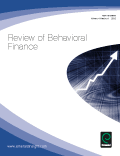
Review of Behavioral Finance
Scope & Guideline
Innovating Financial Strategies Through Behavioral Understanding
Introduction
Aims and Scopes
- Behavioral Finance Theories and Models:
The journal focuses on developing and applying behavioral finance theories and models that elucidate the psychological factors influencing investor decision-making and market outcomes. - Investor Behavior and Market Dynamics:
Research on how individual and institutional investor behaviors, including biases and heuristics, affect market volatility, asset pricing, and trading patterns. - Impact of External Factors on Financial Decisions:
Studies that investigate how macroeconomic conditions, geopolitical events, and social influences shape investor behavior and financial markets. - Socially Responsible and Ethical Investing:
Exploration of the motivations and behaviors behind socially responsible investing, including the impact of corporate governance and ethical considerations on investment choices. - Quantitative and Qualitative Analysis in Finance:
The journal publishes empirical research employing both quantitative and qualitative methodologies to analyze financial phenomena, investor sentiment, and market trends. - Emerging Markets and Cryptocurrencies:
A focus on behavioral finance in the context of emerging markets and the cryptocurrency landscape, examining unique investor behaviors in these rapidly evolving sectors.
Trending and Emerging
- Impact of Crises on Investor Behavior:
Recent studies increasingly explore how major crises, such as the COVID-19 pandemic and geopolitical conflicts, influence investor behavior and market dynamics, highlighting the importance of context in behavioral finance. - Behavioral Biases in Cryptocurrency Investments:
The growing interest in cryptocurrencies has spurred research on behavioral biases specific to crypto investors, including herding behavior and emotional decision-making in volatile markets. - Environmental, Social, and Governance (ESG) Factors:
There is a rising trend in examining how ESG factors influence investment decisions, reflecting a growing interest in socially responsible investing and its psychological underpinnings. - Use of Technology and Machine Learning in Finance:
The application of technology and machine learning to analyze investor behavior and market trends is emerging as a significant theme, indicating a shift towards more sophisticated analytical techniques. - Influence of Social Media and Online Communities:
Research focusing on the effects of social media and online investor communities on trading behavior and market sentiment is gaining prominence, reflecting the changing landscape of information dissemination.
Declining or Waning
- Traditional Financial Theories:
There is a noticeable decline in research focusing purely on traditional financial theories without incorporating behavioral aspects, as the field increasingly emphasizes the importance of psychological factors. - General Economic Indicators and Market Predictions:
Studies that solely rely on general economic indicators for predicting market movements are becoming less common, with a shift towards more behaviorally grounded analyses. - Basic Financial Literacy Education:
While financial literacy remains important, the focus has shifted from basic education to more complex behavioral biases and decision-making processes, suggesting a waning interest in foundational literacy topics. - Narrowly Focused Regional Studies:
Research that exclusively examines investor behavior in isolated regions without connecting to broader behavioral finance theories or global trends is becoming less frequent. - Static Analysis of Investor Sentiment:
There is a declining emphasis on static analyses of investor sentiment, with a growing preference for dynamic models that account for changes over time and across different market conditions.
Similar Journals

Review of Asset Pricing Studies
Exploring the Frontiers of Asset Pricing ResearchThe Review of Asset Pricing Studies, published by Oxford University Press, stands as a leading journal in the fields of Economics and Finance, recognized for its rigorous analyses and innovative research since its inception in 2011. This esteemed publication maintains an impressive impact factor and ranks in the Q1 category for both Economics and Finance as of 2023, consistently occupying top positions in Scopus rankings across its relevant categories. With a clear focus on advancing knowledge in asset pricing and investment strategies, the journal serves as a vital platform for researchers, professionals, and students seeking to contribute to and stay informed on the latest developments in these dynamic fields. Despite its lack of open access, the journal ensures wide circulation and accessibility through its reputable publisher, thereby fostering an engaged academic community.

Global Finance Journal
Pioneering research for a global financial future.Global Finance Journal is an esteemed periodical published by Elsevier, dedicated to the dynamic fields of finance and economics. With an impressive history spanning from 1989 to 2024, this journal holds a significant position in the academic community, boasting a Q1 quartile ranking in both Economics and Econometrics, as well as Finance, as of 2023. It is highly regarded in Scopus rankings, placing 40th out of 317 in Finance and 99th out of 716 in Economics and Econometrics, demonstrating its influence and reach among researchers and practitioners alike. Although not an open-access journal, the Global Finance Journal provides rigorous peer-reviewed articles that explore critical issues, advance theoretical frameworks, and address practical applications in global finance. As such, it serves as a vital resource for researchers, financial professionals, and students aiming to deepen their understanding of economic phenomena and contribute to the ongoing discourse in these vibrant disciplines.
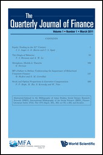
Quarterly Journal of Finance
Navigating Current Issues in Finance and EconomicsThe Quarterly Journal of Finance, published by World Scientific Publishing Co. Pte Ltd, serves as a vital resource for the global academic community in the fields of Finance, Economics, and Strategy and Management. With an ISSN of 2010-1392 and E-ISSN 2010-1406, this journal boasts a respectable impact factor reflective of its standing, being ranked in the Q2 quartile across multiple categories in 2023. The journal's diverse scope includes innovative research and critical reviews that address current issues in financial practices and economic strategies, making it a pertinent platform for scholars and industry professionals alike. Despite its lack of open access, the journal's rigorous selection process ensures the publication of high-quality, impactful research. The Quarterly Journal of Finance is particularly distinguished for its commitment to advancing knowledge and fostering dialogues within its converging fields, proving to be an indispensable asset for researchers, professionals, and students eager to stay abreast of developments from 2011 to 2024 and beyond.
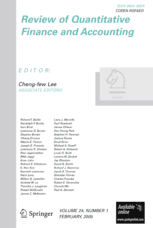
Review of Quantitative Finance and Accounting
Innovating Financial Solutions Through Quantitative MethodsThe Review of Quantitative Finance and Accounting, published by Springer, is a distinguished academic journal that has been at the forefront of scholarly discourse since its inception in 1991. With an ISSN of 0924-865X and an E-ISSN of 1573-7179, this journal specializes in the interdisciplinary realms of accounting and finance, particularly emphasizing quantitative methodologies and their applications in real-world scenarios. With an impressive track record reflected in its 2023 rankings, it sits in the Q2 category across key fields such as Accounting, Business Management, and Finance, demonstrating its relevance and influence within these domains. Although it operates without an Open Access option, the journal's content remains vital for researchers, professionals, and students aiming to deepen their understanding of quantitative approaches in finance and accounting contexts. The Review of Quantitative Finance and Accounting stands as an essential resource for advancing knowledge and fostering innovation within these critical disciplines.
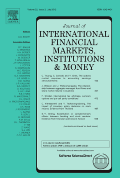
Journal of International Financial Markets Institutions & Money
Shaping the Future of Financial Markets and InstitutionsThe Journal of International Financial Markets, Institutions & Money, published by Elsevier, serves as a leading platform for the dissemination of high-quality research in the fields of finance, economics, and econometrics. With an impressive impact factor reflected in its status as a Q1 journal in both categories for 2023, it ranks among the top journals, positioned at #47 out of 317 in Finance and #111 out of 716 in Economics. This journal offers a unique focus on the interplay between financial markets and institutions on a global scale, making it an essential resource for scholars, practitioners, and students alike. The journal welcomes innovative theoretical, empirical, and applied research, contributing to an exciting dialogue that shapes the future of international finance. For researchers looking to publish their findings, this journal is committed to rigorously engaging with contemporary financial phenomena, positioning itself as a vital cornerstone of academic and professional discourse.
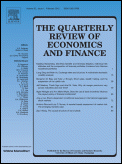
QUARTERLY REVIEW OF ECONOMICS AND FINANCE
Elevating Economic Understanding through Rigorous AnalysisQuarterly Review of Economics and Finance is a renowned academic journal published by Elsevier Science Inc. that focuses on key advancements in the fields of economics, econometrics, and finance. With a commitment to fostering scholarly dialogue, this journal provides a platform for researchers and practitioners alike to disseminate innovative ideas and empirical research, contributing to the economic discourse since its inception in 1992. Recognized for its quality, the journal holds an impressive Q2 ranking in both Economics and Econometrics and Finance, with Scopus rankings placing it in the 81st percentile, underscoring its relevance and impact within the scholarly community. While the journal operates under a subscription model, it boasts a global readership and is accessible to professionals and students seeking insightful and rigorous analyses of contemporary economic issues. With its clear objectives of expanding knowledge and influencing practice, the Quarterly Review of Economics and Finance serves as an essential resource for anyone committed to understanding the dynamics of economics and finance in the modern world.

Annals of Finance
Championing Excellence in Financial ResearchThe Annals of Finance, published by Springer Heidelberg in Germany, stands as a pivotal journal within the realms of Economics, Econometrics, and Finance. With a dedicated convergence of research from 2005 to 2024, this esteemed publication features thought-provoking articles that address both theoretical and practical aspects of finance, earning it a commendable Q2 category ranking in the 2023 metrics for both Economics, Econometrics and Finance as well as Finance. The journal serves an essential role in disseminating knowledge and fostering advancements in the field, appealing to researchers, professionals, and students alike. Its rigorous peer-review process ensures the integrity and quality of published works, making it a reliable source for cutting-edge findings and discussions within the finance community. For those looking to navigate the complexities of modern finance through rigorous research, the Annals of Finance is an invaluable resource.

JOURNAL OF PORTFOLIO MANAGEMENT
Elevating Financial Discourse through Empirical StudiesJOURNAL OF PORTFOLIO MANAGEMENT is a premier academic journal dedicated to advancing the field of finance through rigorous research focused on investments, asset management, and portfolio strategies. Published by PAGEANT MEDIA LTD in the United States, this journal has established itself as a vital resource for finance professionals and scholars alike, as evidenced by its consistent ranking in the Q2 category across disciplines such as Accounting, Business Management, Economics, and Finance according to the latest categorization. With an emphasis on empirical studies and theoretical advancements since its inception in 1995, the journal remains a key player in the academic landscape, offering insights valuable for both researchers and practitioners. Although not an open-access journal, it provides access to high-quality, peer-reviewed articles that contribute significantly to the discourse on portfolio management. The ISSN for traditional publications is 0095-4918, while the E-ISSN is 2168-8656, ensuring wide-reaching dissemination of complex financial concepts. Immerse yourself in the latest findings to enhance your understanding and application of portfolio management strategies.

Review of Pacific Basin Financial Markets and Policies
Navigating Trends and Policies Across the PacificThe Review of Pacific Basin Financial Markets and Policies is a prominent academic journal dedicated to exploring the dynamic landscape of financial markets and policies within the Pacific Basin region. Published by World Scientific Publishing Co. Pte Ltd and based in Singapore, this journal serves as a vital platform for researchers, professionals, and students interested in the intricacies of finance and economics. With an ISSN of 0219-0915 and E-ISSN 1793-6705, it encompasses a broad scope addressing critical issues and emerging trends from 2003 to 2024. Despite its current positioning within the Q4 quartile for both Economics and Econometrics as well as Finance, the journal fosters invaluable contributions that encourage scholarly communication and innovation. Access to the journal is through various academic libraries and institutions, providing an essential resource for those seeking to enhance their understanding of the financial frameworks in the Pacific region.
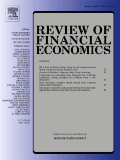
Review of Financial Economics
Fostering Discourse on Contemporary Financial IssuesReview of Financial Economics, published by WILEY, stands as a prominent peer-reviewed journal in the fields of economics and finance. Established in 1994, this journal provides a platform for rigorous research and thoughtful discourse, contributing to the advancement of knowledge in financial theory and its applications. With an HIndex indicative of its citation impact, it ranks in the Q3 quartile for both Economics and Econometrics, as well as Finance, based on the 2023 categorization, underscoring its role in the academic community. Although it does not currently offer Open Access, the journal remains accessible to a wide audience through institutional subscriptions. Researchers, professionals, and students are encouraged to engage with its insightful articles that address contemporary issues and advancements within financial economics, fostering a deeper understanding of the complex interplay between economic systems and financial markets.